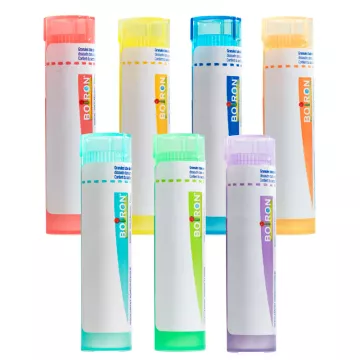What is a hemorrhoidal crisis?
A hemorrhoidal attack is characterized by inflammation and swelling of the veins in the anal region, which can cause pain, bleeding and noticeable discomfort. This condition is often triggered by constipation, pressure during bowel movements, or a sedentary lifestyle.
What are the symptoms of a hemorrhoidal attack?
Common symptoms of a hemorrhoidal attack include:
- Intense pain in the anal area, particularly during defecation.
- Painless bleeding, often seen on toilet paper.
- Burning or itching sensation around the anus.
- Possible formation of one or more sensitive nodules around the anus.
How can I quickly relieve a hemorrhoidal crisis?
For fast relief, consider the following approaches:
- Ice application: Ice can reduce inflammation and pain. Apply an ice pack wrapped in a soft cloth directly to the affected area several times a day for 15 minutes.
- Warm sitz baths: Immerse the anal area in lukewarm water for 15 to 20 minutes, several times a day. This can help reduce inflammation and relieve pain.
- Anti-hemorrhoidal creams: Using creams or suppositories prescribed by a healthcare professional can help reduce inflammation and control symptoms.
- Maintaining hygiene: Gently cleanse the anal area after each bowel movement using lukewarm water or alcohol-free wipes to avoid irritation.
- Managing constipation: Adopt a high-fiber diet, drink plenty of water and consider mild laxatives on medical recommendation to facilitate bowel movements and reduce pressure on hemorrhoids.
How can I prevent hemorrhoidal attacks?
Hemorrhoidal attacks can be prevented by adopting the following practices:
- Increasing fiber intake: Eat more fruit, vegetables, whole grains and legumes to facilitate intestinal transit and prevent constipation.
- Hydration: Drink at least 8 glasses of water a day to help maintain bowel regularity.
- Regular exercise: Physical activity can reduce pressure on pelvic veins and improve intestinal transit.
- Avoid sitting for too long: Take regular breaks and limit the time spent sitting to reduce pressure on the pelvis.
- Weight management: Maintain a healthy weight to reduce pressure on pelvic and anal areas.
When should you consult a doctor about a hemorrhoidal crisis?
It's crucial to consult a healthcare professional if:
- Pain persists despite home treatment.
- Bleeding becomes heavy or does not stop.
- You experience extreme pain that disrupts your daily routine.
- Signs of infection, such as excessive redness, heat or pus, appear.
What's the difference between internal and external hemorrhoids?
Internal hemorrhoids are located inside the rectum and are generally not visible. They may not be painful due to the absence of pain receptors in this area, but they can bleed when stools are passed. External hemorrhoids, on the other hand, lie under the skin around the anus and can be very painful, especially when they become inflamed or when a blood clot forms inside.
What factors can aggravate haemorrhoidal attacks?
Several factors can aggravate hemorrhoids and provoke attacks, including:
- Constipation or straining during bowel movements: This increases pressure in the hemorrhoidal veins.
- Pregnancy: Increased pressure in the abdomen can aggravate hemorrhoids.
- Advanced age: The tissues supporting the veins in the rectum and anus can weaken with age, increasing the risk.
- Prolonged sitting: Sitting for long periods can increase pressure on hemorrhoidal veins.
- Obesity: Being overweight puts extra pressure on abdominal and pelvic veins.
Can hemorrhoids be treated with natural remedies?
Yes, some natural remedies can be used to treat the symptoms of hemorrhoids:
- Aloe vera: Known for its anti-inflammatory properties, aloe vera can help relieve inflammation and irritation.
- Coconut oil: Can be applied topically to reduce inflammation and moisturize the affected area.
- Chamomile infusions: Used in sitz baths, these can help reduce inflammation and soothe itching.
- Cider vinegar compresses: Can help reduce swelling and pain when applied externally.
However, it's important to consult a healthcare professional before starting any natural treatment to ensure it's appropriate and safe for your specific situation.
How can dietary changes help prevent hemorrhoidal attacks?
Adopting a fiber-rich diet is crucial to preventing hemorrhoidal attacks. Fiber helps to
- Improve digestion: It increases stool volume and facilitates stool passage, reducing pressure on hemorrhoids during bowel movements.
- Reduce constipation: Avoiding constipation reduces the need to strain during bowel movements, a major factor in hemorrhoid formation.
Foods to focus on include green vegetables, fresh fruit, whole grains and legumes. It's also advisable to drink enough water to help the fibers work effectively.
When is hemorrhoid surgery necessary?
Surgical intervention may be considered when hemorrhoids cause severe pain, heavy bleeding or if they don't respond to conservative treatments. Surgical options include:
- Elastic ligation: involves placing a small elastic band around the base of the hemorrhoid to cut off blood flow, causing it to fall off.
- Hemorrhoidectomy: Surgical removal of hemorrhoids can be performed under general or local anesthesia.
- Infrared photocoagulation: A technique that uses heat to induce scarring and help reduce hemorrhoids.
